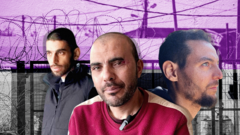In a shocking revelation, several Palestinian detainees released from Israeli detention have accused Israeli military and prison officials of severe mistreatment and torture. Testimonies point to systematic abuse, including chemical burns, electric shocks, and lack of medical care, igniting debates on human rights violations amid the ongoing Israeli-Palestinian conflict.
Allegations of Torture in Israeli Detention: Palestinian Detainees Speak Out

Allegations of Torture in Israeli Detention: Palestinian Detainees Speak Out
Released Palestinian detainees recount harrowing experiences of abuse and torture during their time in Israeli custody, sparking outrage and calls for accountability.
The harrowing experiences of Palestinian detainees, recently released into Gaza, have surfaced through interviews conducted by the BBC, shedding light on allegations of abuse and torture inflicted by Israeli military and prison staff. The testimonies of five individuals reveal disturbing accounts of mistreatment, highlighting broader issues of human rights violations in custodial settings.
One detainee, Mohammad Abu Tawileh, a mechanic aged 36, described being set alight and subjected to chemical burns, stating, “I thrashed around like an animal in an attempt to put the fire out.” The men, arrested in Gaza following the attacks on October 7, 2023, were detained under Israel’s Unlawful Combatants Law, allowing indefinite imprisonment without formal charges. The detainees were interrogated about their purported links to Hamas and the whereabouts of hostages but were reportedly not involved in the October attacks. Their narratives suggest widespread abuse, including beatings, electric shocks, and neglect of medical needs.
The testimonies, which were corroborated by medical professionals who treated some of the men upon release, raise critical questions regarding the treatment of detainees in Israel's custody. During their confinement, they recounted being stripped, blindfolded, and subjected to psychological intimidation, while access to necessary medical care was systematically denied.
The Israel Defense Forces (IDF) responded to these allegations, asserting that they "completely reject accusations of systematic abuse of detainees." They noted that some cases would be examined by relevant authorities but highlighted that several claims lacked sufficient details for investigation. The Israel Prison Service (IPS) echoed these sentiments, stating they were unaware of any such instances of abuse.
Legal experts, including Dr. Lawrence Hill-Cawthorne, emphasized that the treatment described by the detainees is inconsistent with both Israeli and international law, with components of their allegations meeting the definition of torture. Reports of similar abuses have emerged from various human rights groups, including the United Nations and B'Tselem, painting a troubling picture of detainee treatment, including claims of sexual violence and brutality.
The context of these revelations comes amid ongoing tensions following the October conflict, where accusations against both Israeli forces and Hamas regarding the treatment of detainees and hostages abound. While Israel insists on the necessity of stringent measures for security reasons, critics argue for the need to adhere to humanitarian laws and uphold the rights of all individuals, regardless of the conflict's complexities.
Moreover, Palestinians freed from Israeli custody have expressed both relief and trauma, grappling with their experiences in detention. Some detainees continue to suffer from physical and psychological scars, with one young man stating his desire to emigrate due to the horrific events witnessed, illustrating the profound impact of such experiences on their lives.
As the global community continues to monitor the evolving situation, these testimonies accentuate the pressing need for accountability and an end to abusive practices in detention facilities, highlighting a pivotal moment in the discourse surrounding human rights in conflict zones.




















